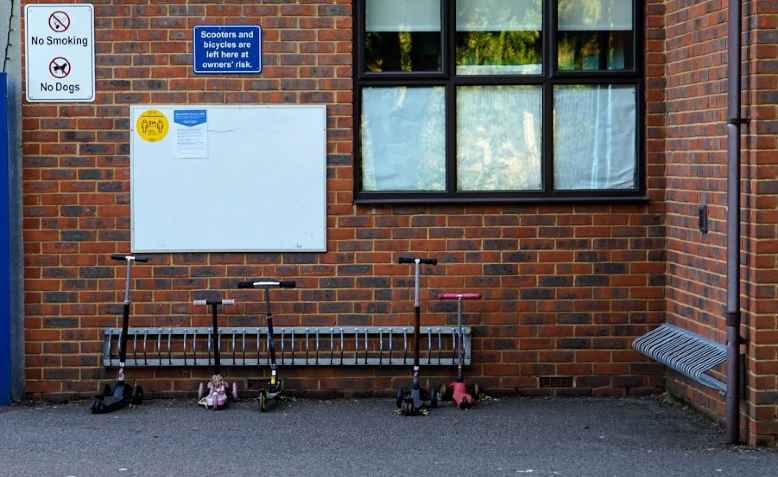 Scooters. Photo: Neda Radulovic-Viswanatha
Scooters. Photo: Neda Radulovic-Viswanatha
Teachers are working hard to support children returning to school in difficult circumstances, writes Alex Snowdon
Like many teachers, I’ve been back to school this week. I was never entirely away: I was part of a weekly rota for several weeks during lockdown, supporting a small number of children of key workers (mainly in the NHS). Teachers, whether able to help on staff rotas or not, were working from home during this time, most of us on a steep learning curve to get the hang of online education.
It is a strange experience – very different to normal schooling. In our middle school the Year 6 children are in ‘bubbles’ where they have the same teacher all day, in the same classroom, and there is no mixing outside that group at break or lunch times. They must sit at their allocated desk all day, there is no sharing of resources and very limited opportunity for pair or group work or practical activities.
The same is happening everywhere. This is realistically what school must look like if we are going back while there is still a pandemic. Schools are taking very seriously the need for social distancing, enhanced hygiene and cleaning, and rearranged timetabling, staffing and so on, in a time frame that the government insisted on despite massive opposition.
Opportunities and problems
In some ways the experience presents welcome opportunities. Having a class of 10 children (as I currently do) is refreshing. It helps with building relationships and giving them lots of attention. There is also a flexibility to how we organise our time that is good for staff and children alike: getting outdoors more often than usual, for example, and focusing more on wellbeing, without major curriculum pressures.
We have to hope that all this will prompt a greater desire for a ‘new normal’ in the longer term, not merely returning to the old government agenda for schools: exam factories, high-stakes testing, Ofsted, narrowing curriculum etc. It should not take a massive public health emergency to prompt a rethink of schools policy.
The pupils are generally pleased to be back. I like spending time with real children in a real classroom again; they like seeing each other and having more opportunities for fully-rounded learning. They have commented on how hard it is to learn at home and how much they appreciate having the support of a teacher.
We should also never underestimate the versatility of teachers. As a profession we did a remarkable job of adapting to unprecedented circumstances in March. We have turned ourselves into providers of remote learning. Now we are again proving adaptable: my colleagues have been sharing bright ideas for how to creatively adapt to these odd classroom conditions.
There are also undoubtedly constraints. The isolated bubble approach means the children cannot connect with many of their friends. There are activities that we simply cannot do and resources and facilities that are going unused.
Our versatility is being tested when it comes to monitoring work and giving feedback – there is no marking of books allowed and even reading their writing is a stretch (literally) when you are trying to maintain physical distance.
Pushed back too soon
This is all against the background, however, of teachers knowing that we should not be back yet. Parents know it too: everywhere large numbers chose not to send their kids back this week. Staff are in some ways pleased to be in, but in my school they are also relieved that we have sufficient staff numbers to operate a rota (I’m in 3 days a week).
But there are primary schools – those that have done exactly what Boris Johnson wanted – where three year groups have returned and staff are back in full time, with pressure on those who really should be working from home for health reasons. I don’t know how such schools can seriously sustain online learning for those still at home. I also wonder how staff working with Reception and Year 1 children are finding the attempts at social distancing.
My school’s preparations were excellent and everything in the (incredibly detailed) union guidance, not just the Department for Education guidance, is being implemented. It feels as safe as it can be in the circumstances, especially the ‘bubble’ approach so there is minimal interaction.
Watching the news isn’t reassuring though. The death toll isn’t coming down fast enough. The testing and tracing situation is a bad joke.
On two of the key tests set by the National Education Union – transmission numbers coming way down and testing being in place – it just isn’t good enough. Furthermore, the current lifting of lockdown restrictions will make it harder to pull those figures down to where they need to be.
In areas where schools have not yet reopened, teachers and support staff should – through their unions – keep pushing back against immediate reopening. It is too soon. In areas where schools have been selective about which priority year groups to bring back, there should be no further wider reopening until it is safe.
Secondaries should only have any wider reopening, however limited in numbers, when the R number is clearly down to a safe level. It is essential that the education unions, supported by parents and the labour movement, sustain pressure for safety to come first. This is in the interests of staff, children, their families and the whole of society.
Before you go
Counterfire is growing faster than ever before
We need to raise £20,000 as we are having to expand operations. We are moving to a bigger, better central office, upping our print run and distribution, buying a new printer, new computers and employing more staff.

